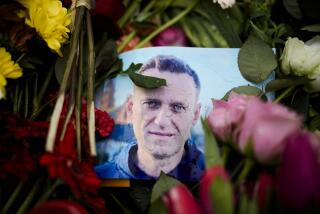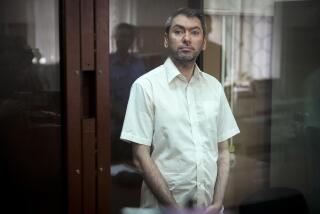Sakharov Will End Attacks if He Can Return to Moscow : Appeal to Gorbachev Revealed
- Share via
PARIS — Andrei D. Sakharov has offered to cut back his activities as a human rights campaigner and promised not to talk to Westerners if the Kremlin will agree to end his internal exile and let him return to Moscow, his family said today.
Sakharov’s offer was revealed by his stepdaughter, Tatyana Yankelevich, who is accompanying her mother, Yelena Bonner, on a tour of Europe before Bonner returns to the Soviet Union next week to resume her exile with Sakharov in the closed city of Gorky.
Yankelevich said Sakharov told Soviet leader Mikhail S. Gorbachev in a letter last July that he wanted to “cease entirely taking part in any public activity (of course, apart from the most exceptional cases) and to concentrate, instead, on my scientific work.”
Sakharov’s relatives, including Bonner, his wife, said they are cautiously optimistic that the Kremlin might relax the conditions of his internal exile in Gorky after Bonner returns.
Bonner Returns Monday
Bonner, 62, who today ended a series of meetings with French political leaders, is due to return to Moscow on Monday after brief trips to Britain and Italy, ending six months in the West for medical treatment.
“There is no real foundation for it, but I am an optimist. I am returning to exile with a clear head,” Bonner said Tuesday after meeting with President Francois Mitterrand.
Yankelevich said the couple’s exile in Gorky, which began in January, 1980, was “unbearable” because of their complete isolation from human contact, except with the KGB security police.
Initially, Bonner was free to travel to Moscow, but in August, 1984, she was sentenced to five years’ exile to the town 250 miles east of Moscow.
Dissident Movement
Yankelevich said Sakharov “is not just a human rights advocate” and indicated that he did not want to resume the role he played in the late 1970s as a central figure in the Soviet dissident movement.
The movement itself has virtually collapsed with the imprisonment or emigration of most of its leaders. “Things have changed. There is a lot of apathy,” she said.
She said Sakharov wanted to retain the right to speak out on major issues, such as, for instance, “Star Wars,” of which he takes a critical view, or perhaps the recent Chernobyl nuclear disaster.
He also wants to be involved with the future East-West cooperation in nuclear fusion research linking the Soviet Union’s Tokamak project with similar projects in the United States and Western Europe.
Research for Weapons
From the 1940s to the 1960s, as an atomic physicist, Sakharov was at the center of research into nuclear weapons.
Yankelevich said she has not given up hope that Soviet political authorities may one day reverse their longstanding refusal to allow Sakharov to travel to the West, allegedly because he still knows military secrets.
Both Mitterrand, due to visit Moscow in July, and French Prime Minister Jacques Chirac promised Bonner in meetings Tuesday to use what influence they could with the Kremlin, at least to help Sakharov return to Moscow.
Many believe that Western pressure was partly responsible for the Soviet decision to allow Bonner to travel to the West for heart bypass surgery last December.
More to Read
Sign up for Essential California
The most important California stories and recommendations in your inbox every morning.
You may occasionally receive promotional content from the Los Angeles Times.













